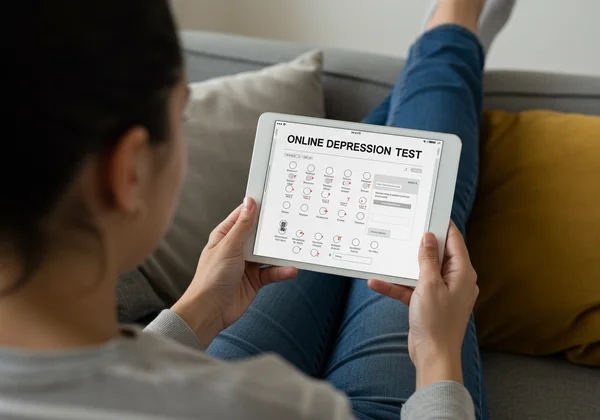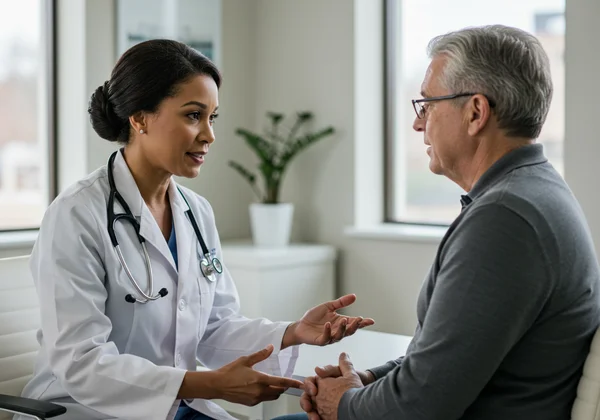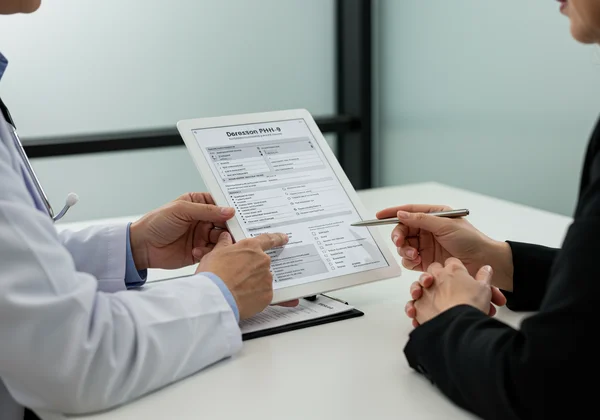How to Talk to a Doctor About Depression & Get a Depression Test
September 29, 2025 | By Liam Thornton
Feeling overwhelmed or uncertain about discussing your mental health with a doctor? You're not alone. Taking an online depression test can be a powerful first step in understanding your feelings, but the next crucial move might be to consult a healthcare professional. Many people wonder, How do I check if I am depressed? and a conversation with your doctor is the definitive answer. This guide will walk you through preparing for and confidently navigating that important conversation, ensuring you get the depression test and support you need.
Taking a preliminary step with a confidential self-assessment can provide a structured starting point for this vital discussion. It helps organize your thoughts and gives you a tangible reference to share.

Preparing for Your Mental Health Appointment
The thought of scheduling a mental health appointment can feel daunting, but preparation is key to making the experience as smooth and productive as possible. Getting ready beforehand empowers you to communicate effectively and ensures your concerns are fully addressed. Preparing beforehand can transform any anxiety into a proactive approach, setting a positive tone for your visit.
Why Taking the First Step is Crucial for Your Well-being
Procrastinating on your mental health can allow feelings of sadness or hopelessness to deepen. Taking the first step to see a doctor is a courageous act of self-care that opens the door to understanding and recovery. It's an acknowledgment that your emotional wellbeing matters and a reminder that seeking help is a sign of strength, not weakness. A professional can provide clarity, rule out other medical conditions, and guide you toward effective treatments that can significantly improve your quality of life.
Documenting Your Feelings and Symptoms Beforehand
Doctors rely on specific information to make an accurate assessment. Simply saying "I feel sad" might not be enough. Before your appointment, spend some time creating detailed symptom descriptions. Keep a simple journal for a week or two. Note how you've been feeling emotionally (sad, irritable, empty), physically (fatigued, aches, changes in appetite or sleep), and cognitively (trouble concentrating, making decisions). Documenting the frequency, duration, and intensity of these symptoms provides your doctor with invaluable data.

What Information to Bring to Your Doctor's Visit
Being organized for your doctor's visit will help you feel more in control. Prepare a small folder with essential information. Include your symptom journal, a list of any medications or supplements you are taking, and your personal and family medical history. If you've taken an online screening, like the one offered on our platform, bring your results. This gives the doctor a clear baseline of your self-reported symptoms and shows you've been proactive about your health.
How to Talk to Your Doctor About Depression
The conversation itself is often the biggest hurdle. Remember, doctors are trained professionals who discuss sensitive health topics every day. They are there to help, not to judge. Your role is to be as open and honest as possible to ensure you receive the best care.
Starting the Conversation: Breaking the Ice with Your Doctor
You don't need a perfect opening line. Be direct and simple. You could start by saying, "I've been concerned about my mental health lately," or "I haven't been feeling like myself, and I'd like to talk about the possibility of depression." Bringing it up at the beginning of the appointment ensures you have enough time to discuss it thoroughly. Seeking professional help starts with these few simple words.

Effectively Describing Your Symptoms and Experiences
Using your symptom journal, clearly describe what you've been experiencing. Be specific. Instead of "I'm tired," try "I have no energy to get out of bed in the morning, even after a full night's sleep." Mention how these symptoms are impacting your daily life—your work, your relationships, and your hobbies. Discussing the specific warning signs of depression you've noticed helps your doctor understand the full scope of your situation. Don't downplay your feelings; your experience is valid and important.
Discussing Your Online Depression Test Results
Your results from an online assessment can be an excellent conversation starter. You can say something like, "I took an online depression test, and my results indicated I might have moderate symptoms. I wanted to discuss this with you." This frames the online tool correctly—as a screener that prompted you to seek a professional opinion. This approach shows you are informed and engaged in your health. A quick depression test can be the perfect bridge to this professional dialogue.
Understanding a Depression Diagnosis & Your Next Steps
Whether you receive a diagnosis or not, the appointment is a step forward. The goal is to leave with a clearer understanding of your health and a plan for what to do next. This is the beginning of a collaborative journey with your healthcare provider.
What to Expect During a Depression Screening or Assessment
During the appointment, your doctor will ask you a series of questions about your symptoms, lifestyle, and medical history. They may use a standardized questionnaire, such as the PHQ-9, which is a common depression test tool for assessing depressive symptoms. They might also conduct a physical exam or order blood tests to rule out other conditions, like thyroid issues or vitamin deficiencies, that can mimic the symptoms of depression. This comprehensive approach ensures an accurate evaluation.

Key Questions to Ask Your Doctor About Treatment Options
Empower yourself by being an active participant in your care. Don't be afraid to ask questions about potential treatment options. Here are a few to consider:
- What is your professional diagnosis of my condition?
- What are the different treatment options available?
- What are the potential benefits and side effects of each option?
- Are there lifestyle changes, like diet or exercise, that could help?
- Do you recommend therapy, medication, or a combination of both?
- What are the next steps, and when should I schedule a follow-up?
After Your Appointment: Continuing Your Mental Health Journey
Your mental health journey doesn't end when you leave the doctor's office. Follow the agreed-upon plan, whether it's starting therapy, taking medication, or implementing lifestyle changes. Keep track of your progress and any changes in your symptoms. Stay in communication with your doctor and attend follow-up appointments. Remember that finding the right treatment can take time, and patience is a key part of the healing process. Using tools like an online screening tool periodically (with your doctor's guidance) can help you monitor your progress.
Your Path to Well-being: Next Steps with Your Doctor
Talking to a doctor about depression is a definitive step toward reclaiming your well-being. By preparing for your appointment, communicating your symptoms clearly, and actively participating in your treatment plan, you are taking control of your mental health. It’s a process, but it’s one you don’t have to navigate alone.
Your journey to feeling better starts with a single step. If you're unsure where to begin, understanding your symptoms is a great starting point. Take our free test to get a confidential, instant overview of your emotional state and empower your conversation with a healthcare professional.

Frequently Asked Questions About Seeking Help for Depression
How do I know if I need to talk to a doctor about depression?
If you've been experiencing persistent feelings of sadness, emptiness, or a loss of interest in activities you once enjoyed for two weeks or more, it's a good idea to speak with a doctor. Other signs include significant changes in sleep or appetite, fatigue, and difficulty concentrating. An online tool can help you assess your symptoms, and a result suggesting anything more than minimal symptoms should prompt a conversation with a professional.
What are the warning signs of depression I should tell my doctor about?
Be sure to tell your doctor about both emotional and physical symptoms. Key warning signs of depression include a consistently low mood, irritability, feelings of worthlessness or guilt, changes in weight, sleep disturbances (sleeping too much or too little), loss of energy, and thoughts of self-harm. Mention how these symptoms are impacting your ability to function at work, school, or in your relationships.
Can a doctor really help me get a depression test?
Yes, a primary care doctor is often the first point of contact for getting a depression test. While there's no blood test for depression, doctors use validated screening tools, clinical interviews, and physical exams to make an accurate assessment. They can provide a diagnosis, prescribe medication if necessary, and refer you to a mental health specialist, such as a therapist or psychiatrist, for further treatment.
What if my depression test score was mild but I still feel bad?
Your feelings are always valid, regardless of a test score. A screening tool provides a snapshot, but it doesn't capture your full experience. If you feel unwell, it's always worth discussing with a doctor. Sometimes, even "mild" symptoms can significantly impact your quality of life, and early intervention can prevent them from becoming more severe. You can use your results from our website to start the conversation about why you feel something is wrong.